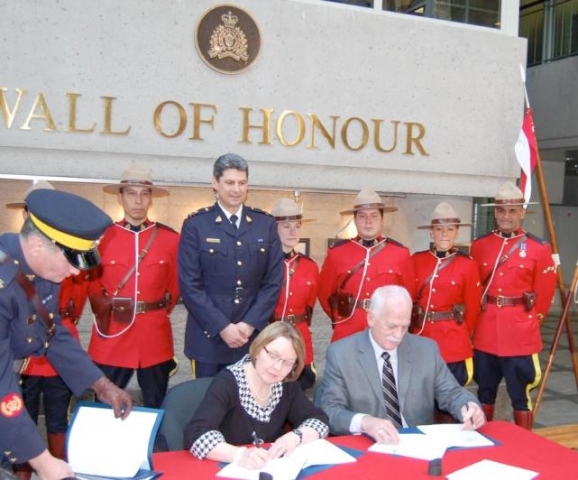Province, RCMP ink 20-year deal as two sides opt for labour peace
It wasn’t that long ago when the B.C. government was going to toss the RCMP out like yesterday’s laundry.
Wednesday, the two sides put aside any bad feelings before inking a 20-year agreement, which is essentially identical to contracts reached in five other provinces and three territories, and comes a year after B.C. threatened to pull out of negotiations altogether and set up its own force.
“B.C. set out to gain new management tools based on extensive consultation and input from our municipal partners,” said Minister of Justice and Attorney General Shirley Bond.
“This contract gives us new management and oversight ability that will allow us to contain costs and take a more direct role in determining what police services will look like in our province.”
Under the new agreement, the province and municipal governments will have greater input into how the RCMP spends money and how its operation is structured and who is appointed to senior management positions.
The force will continue to fall under the responsibility of B.C.’s new independent investigation unit, which will investigate serious allegations involving police officers in the province.
This was a major concern in B.C., where the death of Robert Dziekanski, who was stunned with a Taser by Mounties at Vancouver’s airport, put a spotlight on RCMP accountability.
The contract contains a two-year opt-out clause, and a mandatory review in five years.
“The RCMP is B.C.’s police force and we remain committed to being the accountable, transparent and trusted organization British Columbians deserve,” said Deputy Commissioner Craig Callens, Commanding Officer of the B.C. RCMP.
“This new agreement reflects our belief that the effective delivery of police services must be done in collaboration with contracting partners and local communities.
“It underscores the value and importance of the relationships necessary for us to remain connected to the many diverse and unique communities we are honoured to serve throughout this province.”
The cost structure remains unchanged, with the province paying 70 per cent of the costs of provincial policing and large cities paying 90 per cent of their policing costs.
But there will be increases.
The provincial share for B.C. is currently about $310 million per year, and that figure will jump by about $5.7 million for 2012-2013 — an increase of 1.7 per cent.
Cities with populations of more than 15,000 people are collectively paying $458 million right now, and that total will increase by $2.35 million in the coming year, or 0.69 per cent.
Smaller municipalities will together pay $320,000 more, which is about one per cent more than the $54 million the already pay.
The agreement follows contentious negotiations between the provinces and the federal government, with the two levels of government sparring over costs and control over the decision making process.
“Today is a significant milestone for RCMP Contract Policing,” said Minister of Public Safety Canada Vic Toews.
“I am very pleased to announce that our Government and the Province of British Columbia have reached an agreement that will continue the relationship between the Royal Canadian Mounted Police and the people of British Columbia for the next two decades.”


























Comments